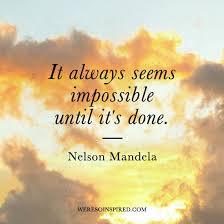"I always had the naive confidence that I'd be successful, so I just put one foot in front of the other, built my network, and made the best long-term decisions I could."
-- Tim Draper, Silicon Valley Venture Capitalist, founder of DFJ (formerly Draper Fisher Jurvetson) and founder of Draper University
As a child, no one told me I could be anything I wanted to be.
Sad, you say? Limiting? Demoralizing? Unkind?
Now, what if I told you I felt completely unfettered precisely because no one uttered those words to me? What if I told you I never felt limitations because no one ever raised this issue?
Change your perspective?
Acknowledging limits, even how we overcome them, creates limits. Limits arise precisely because we focus on them.
We see difficulties. We fear roadblocks. And then our brain shuts down. We fear we are unable to accomplish something, and then our brain stops working on creative solutions. We preempt possible difficulties without assessing their actual probability. We compare ourselves and loved ones to others, relating to those who tried and failed. And then we legitimize these rationalizations by highlighting the differences we have from those who actually succeed.
I was one of the lucky ones. As I began my career, I felt optimistic. Unfettered. I was on the rise, holding positions at some of the most prestigious industry leaders in the world. Had I stayed on this path, I expected to climb high.
After the birth of our second child, I chose to become a stay-at-home mom. Because I decided to leave the workforce during my prime earning years, I often reflect upon that decision.
During those full-time parenting years, I did what many moms and dads who place their careers on hold for childrearing do:
- I led the strategic mission of educating a family, including hiring, negotiating, and paying schools, coaches, trainers, transportation, and finance providers, the way the buying department in a manufacturing plant optimizes vendors.
- I started and led after school programs, including a math team, not only fine-tuning the skills of the mathematical elite, but also inspiring confidence and enjoyment for the field among those for whom the subject had seemed insurmountable -- in effect, creating a unified team spirit.
- I led large groups of volunteers to raise funds for schools, health initiatives, and education programs, harnessing disparate energy into tangible results.
- I coordinated the academic and extracurricular logistics of two students at different schools and one entrepreneurial spouse who traveled extensively, towards the goals of family dinners, vacations, and shared conversations, the way a band manager synchronizes a long-term, multi-stop tour.
- I took on the role of general contractor to manage contractors, architects, city planning departments, and a1M budget to rebuild our home, the way a product manager decides among tradeoffs on a brand's image, distribution, and packaging, coordinating with other project management systems.
- And most importantly, I give the world two kind, contributing members of society, who I believe will make the world a better place -- my personal IPO.
When I decided to return to full-time paid employment, I faced surprising difficulty finding a conventional corporate job despite the skills I had maintained and sharpened while on earning hiatus. Hiring managers, HR personnel, and other decision makers seemed unable to see the valuable skills of an experienced, well-educated middle-aged woman who had always remained an active and contributing member of society -- but had simply not been paid for her most recent contributions, which were extensive.
I learned I was not alone.
Who set these rules anyway? Not me.
Since I never subscribed to these rules, I wasn't about to start now.
From my upbringing, I knew that we do ourselves and loved ones a disservice when we live in reactive mode, evaluating our abilities and successes by what others do and say.
So instead, I became proactive and started Connect•Work•Thrive, a company that empowers mid-career professionals to change careers or return to the workforce after a career break.
An important outcome has been that, once these workers find jobs, the companies that hire them clamor for others exactly like them.
Because we're changing the conversation.
Because we're changing the rules.
Earlier on Huff/Post50:


